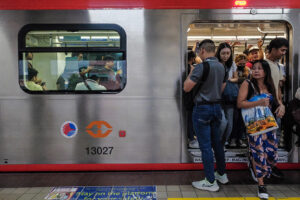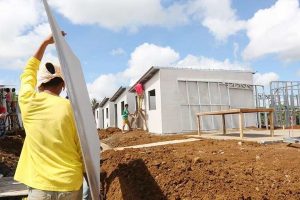By Ashley Erika O. Jose, Reporter
COMMUTERS in Metro Manila will pay higher fares for the Light Rail Transit Line 1 (LRT-1) starting April 2 after the Department of Transportation (DoTr) approved a new fare matrix.
In a letter dated Feb. 14 but published on Tuesday, the DoTr said it had approved the petition of Light Rail Manila Corp. (LRMC) for adjustments in the LRT-1 fare matrix.
The letter was signed by Transportation Undersecretary for Railways Jeremy S. Regino.
Beginning April 2, the boarding fare will be raised to P16.25 from P13.29, while the distance per kilometer fare will be increased to P1.47 from P1.21.
Based on the approved fare matrix, the maximum fare for a single-journey end-to-end trip will increase by P10 to P55 from P45. This will cover the trip from FPJ Station (formerly Roosevelt) in Quezon City to Baclaran Station in Pasay City, including the last station of the Cavite extension Phase 1.
Meanwhile, stored value cardholders will pay P9 more for the end-to-end trip, bringing the fare to P52.
The approved rate is lower than LRMC’s proposal to raise the end-to-end-trip fare to P60 for single-journey tickets and P58 for stored value cards.
LRMC President and Chief Executive Officer Enrico R. Benipayo said the company is grateful for the approval of new fares.
“In the past 10 years of operating and maintaining the 40-year-old railway line, this will only be the second time that LRMC has been allowed to implement fare adjustments for LRT-1,” he said in a statement.
The private operator took over LRT-1 from Light Rail Transit Authority (LRTA) in 2015.
The company said the newly approved fare matrix, which is lower than its petition, is the same as its fare adjustment petition in 2022.
Under its concession agreement, the private operator may seek a fare adjustment once every two years. Mr. Benipayo has said previously the approved rate in 2023 is still well below the notional fare and has resulted in a fare deficit of P2.17 billion.
“Public transport is a service that requires continuous investment in maintenance, upgrades and expansion. Countries with world-class transport systems such as Singapore and Japan adjust fares regularly to keep services efficient and safe. We are thankful to our partners in government for their support in ensuring that we can sustain the necessary upgrades,” Mr. Benipayo said.
LRMC reiterated that it has made substantial operational improvements and system upgrades for LRT-1, which includes the completion of phase 1 of the LRT-1 Cavite extension last year. The second and third phases of construction of the LRT-1 Cavite extension may begin next year if right-of-way acquisition issues are resolved.
“LRMC has since introduced new trains, station upgrades and better service efficiency,” Mr. Benipayo said.
He also justified the fare adjustment as LRMC also improved LRT-1’s cycle time — the average time for a train to complete an end-to-end journey — from 106 minutes or almost two hours to 91 minutes in 2024.
Rene S. Santiago, former president of the Transportation Science Society of the Philippines, said the approval of the LRT-1 fare hike is a necessary step since the government has to comply with its commitments under the public-private partnership (PPP) deal.
“(This) clears the way for more PPP tenders in the future. More than that, all public transport — rail, bus, jeepney — deserve long-delayed fare adjustments,” he said in a Viber message.
Meanwhile, Renato M. Reyes, Jr., secretary-general of Bagong Alyansang Makabayan (Bayan), said they are not surprised by the approval of the fare increase.
He called for a review of the private operator’s concession agreement which allows them to adjust fares every two years.
In a statement, transport group PISTON National President Mody T. Floranda called the fare increase unjustified and would hurt the pockets of ordinary Filipinos.
LRMC is a joint venture of Ayala Corp., Metro Pacific Light Rail Corp. and Macquarie Infrastructure Holdings (Philippines) Pte. Ltd.
Metro Pacific Light Rail is a unit of Metro Pacific Investments Corp., which is one of three Philippine subsidiaries of Hong Kong’s First Pacific Co. Ltd., the others being PLDT Inc. and Philex Mining Corp. Hastings Holdings, Inc., a unit of PLDT Beneficial Trust Fund subsidiary MediaQuest Holdings, Inc., has an interest in BusinessWorld through the Philippine Star Group, which it controls.






